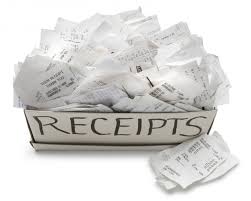|
Clients ask me all the time: what receipts do I need to keep? Why do I need to keep them and where should I keep them? Here is a guideline.
Home Receipts: I subscribe to an email newsletter from Laura Leiden, Realtor with Keller Williams. Her most recent newsletter explains why every homeowner should hold onto repair and improvement receipts. Here is a copy of the newsletter. Overlooked Recordkeeping Homeowners are familiar that they can deduct the interest and property taxes from their income tax returns. They also understand that there is a substantial capital gains exclusion for qualified sales of up to $250,000 if single and $500,000 for married filing jointly. However, ongoing recordkeeping tends to be overlooked. New homeowners should get in the habit of keeping all receipts and paperwork for any improvements or repairs to the home. Existing homeowners need to be reminded as well, in case they have become lax in doing so. These expenditures won't necessarily benefit in the annual tax filing but may become valuable when it is time to sell the home because it raises the basis or cost of the home. For instance, let's say a single person buys a $350,000 home that appreciates at 6% a year. Twelve years from now, the home will be worth $700,000. $250,000 of the gain will be exempt with no taxes due but the other $100,000 will be taxed at long-term capital gains rate. At 15%, that would be $15,000 in taxes due. Assume during the time the home was owned that a variety of improvements totaling $100,000 had been made. The adjusted basis in the home would be $450,000 and the gain would only be $250,000. No capital gains tax would be due. Some repairs may not qualify as improvements but if the homeowner has receipts for all the money spent on the home, the tax preparer can decide at the time of sale. Small dollar items can really add up to substantial amounts over many years of homeownership. The important thing is to establish a habit of putting receipts for home expenditures in an envelope, so you'll have it when you are ready to sell. This article recommends keeping the receipts in an envelope. An envelope is fine if you have a very small amount of receipts. I recommend a file jacket: An enclosed file so receipts do not fall out. Depending on how many different types of improvements were made will determine how many file jackets or envelopes to use. For example: Bathrooms, Kitchen, Garage, etc. Another storage idea is a binder with sheet protectors to sort home receipts by project. However, if you want/need super easy one file jacket, drawer or envelope will do the job. The important thing is to keep the receipts. You do not need to keep service repair receipts on appliances for taxes but you do want to keep them for the warranty period. Tax Receipts: Note there are huge changes to the tax code and it may not benefit you to keep some of these. Check with your own Tax Advisor for what to keep and how long. Keep in a folder labeled Taxes and the corresponding year.
Electronics, Appliances, Furniture and other Big Ticket Item Receipts:
If you want super simple have 1 folder titled Big Ticket Items or whatever you would think of to find these receipts but I would recommend 5 folders for this category: Electronics, Large Appliances, Small Appliances, Furniture and Big Ticket Items. Inventory these items. If your house burns down you will need to claim and prove that you owned these items and provide a valuation to your Insurance Company. One of my friends and ex-colleagues, Julia Marlowe, has her own Inventory Business: Athens Home Inventories I highly recommend Julia if you want to hire someone to do this for you. Auto Repair Receipts: Keep these for proof of maintenance. Some Auto warranty programs require it. It’s also good to have a record of all repairs and service. Clothing & General Shopping Receipts:
I hope this article is insightful and helpful. If you find it helpful please share it. Anyone can sign up to receive my e-newsletter by clicking this link or visiting my website and scrolling down to the sign up link. Adele Gross Chief Executive Organizer Simple Solution Organizing LLC
2 Comments
Tax Deductions
Finding, tallying, and reporting tax deductible deductions are a worthwhile endeavor. Itemizing deductions, if you qualify, can make a substantial difference to the amount of taxes owed. So why do so many people wait until the last minute to figure them out or not bother to calculate them at all? We all know the process is NOT fun, unless you are getting a refund, however those days are long over for most of us. Do you still do your own taxes? My husband and I switched to a CPA many years ago when we received a dreaded letter from the I.R.S. about an error on our return. My husband and I decided to hire a Professional. Our taxes were becoming more complicated each year. A large portion of my business is prepping taxes for clients. I get their tax forms and deductions summarized and ready for their CPA’s. I work with these clients on a regular basis. They appreciate not having to compile everything themselves. Here is a list of some common tax deductions:
Printing and keeping track of your own deductions is becoming more commonplace. There are many companies that don’t mail tax forms. Here are a few examples: Student loan interest, if you or your child paid interest on a student loan and you did not get a form in the mail go to your online account and print it. I contributed to my son’s Georgia 529 plan this year and last year but Path 2 College did not send me a tax form. This saves my family a lot of money on our state taxes. This is upsetting but it is just the way it is. You have to be your own tax advocate. Did you pay a fee for your IRA, Brokerage or any other Investment Account? Make sure you claim it. You may need to “find” the fee on a yearend statement. Investment companies have not had to divulge all of their fees but that is changing in April 2017. Are you over the age of 70 1/2 and not taking your Required Minimum Distributions (RMD’s)? You will be penalized. RMD’s are only required on regular IRA’s not Roth IRA’s. This happened to one of my client’s. Do you have older parents? Find out if they are taking their distributions. Did you donate items to a non-profit this year? Claim a realistic valuation. If you have no idea what your items are worth here are some options. Here is Goodwill’s Tax Deductible values and Salvation Army’s. According to the website Charity Deductions.com taxpayers are leaving $42 Billion unclaimed for non-cash donations. I was surprised when I looked at Salvation Army’s valuation guide; I was undervaluing everything I donated. Tax deduction forms and some tax income forms are not sent out. My daughter had an internship last summer with a large corporation. They did not send her a W-2 (It is a significant amount of money). She had to call the company to find out how to get it. I thought companies had to send out W-2’s? I know they sent it to the Internal Revenue Service…… Anyway the moral of this blog post is to be your own Tax Saving Advocate. It is worth your time to go through all of your check registers, credit card statements and investment statements to look for your hard earned deductions. Happy Tax Organizing, Adele Gross Chief Executive Organizer [email protected] 706-714-1314 |
AuthorAdele Tusson-Gross Categories
All
|
Simple Solution Organizing LLC
Serving Athens and surrounding cities since 2003
706-714-1314 Cell
Please click here to send us an email




 RSS Feed
RSS Feed

